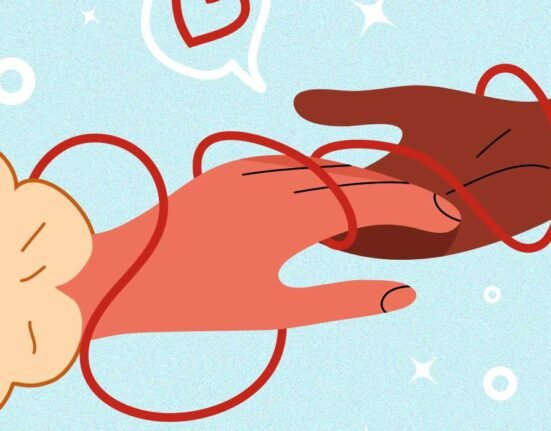Recently came out a much talked movie, and after watching it, one question surely popped, ‘Can you be addicted to a person like drugs? Is this love or is love an addiction’, I felt that movie was an example of love addiction, wherein the actress was male protagonist’s addiction, his obsession, and his so called love.
Love is typically seen as a positive experience. So, can too much of love really be a bad thing or good? The answer is, probably a little of both. Sometimes, love feels good and sometimes it might feel bad. Often a person does not understand why…
WHAT IS LOVE?
Love is a beautiful feeling. Love is an emotion that we all desire. Right from the day we are born, we crave love. The first love we experience is from our parents. Ideally, parent’s unconditional love affirms a child’s worth and life. Mother and father try to fulfill all needs & wishes of a child and give the child a feeling that love is terrific.
Love and affection are two different emotions, though these are often found overlapping. While affection can be defined as a liking for another person owing to the qualities he/ she possesses love is a much deeper emotion. Loving a person means accepting them with all their vice and virtues. It involves caring for them and standing by them during their thick and thin.
When a person is in love and starts a relationship, it feels like a strong connection, like a perfect bond, assuming that this is the one, true love, and will be same forever. This tells us how basic the need for love is.
But few years down the line, when relationship ends or break, we seem determined to keep loving. Why? Is it because we are compelled to fill inner desires? Are we using it to avoid the pressure of stress? The problems in love relationships stem not from the nature of love but from violation of trust
WHAT IS LOVE ADDICTION? AND ARE WE ALL AWARE ABOUT IT?
Love relationships can be good or bad, depending on how they serve us. The question is what is love addiction? How does love become addictive? How can something so wonderful become something that feels so bad? Is it love? Or, is it addiction?
Addiction happens when we develop a habit that we are unable to control. Love addiction is an attempt to gain control of our feelings, and in so doing, we go so far that we give control to someone else. This attempt, then, results in an unhealthy dependency on others. Because we are not in control, the habit takes over all our attention, to the point that other parts of our life suffer.
Love addiction is common; however, most people do not realize they are addicted to love. No, it is much more than just the feeling of being in love. It is more like being addicted to having someone take over your entire being.
Cases of sex, love, and romance addictions, suicide, stalking, rape domestic violence capture the headlines of the newspapers every day. Love addiction can range from unhealthy dependency to violence. An addiction always creates harmful, often ignored consequences. It is only when the addiction becomes unmanageable, people do something about it.
Love addiction doesn’t essentially limit to romantic and sexual relationships. There are equal chances for a person to behave as a love addict with friends, children, any religious figure, or even with a celebrity, whom they have never met.
According to Psychologists: Love addiction is a dysfunctional way of seeing relationships and behaving within relationships. It is unconsciously used to avoid facing our real self – confront our real pain, our real responsibilities, our real needs, and our personal power.
When we are a love addict we make an unconscious effort with other people – you take care of my feelings and make me feel good, and I’ll take care of yours.” We start believing that it is other person’s job to make us feel happy and complete. We don’t realize that this is a dangerous, soul-destroying expectation.
In the popular book, “Is it Love, or Is It Addiction?” psychologist Brenda Schaeffer puts it this way, “Rather than a bonding, it (love) becomes a psychological bondage.”
In a healthy relationship, you can care for another person, and help them in practical ways, doing your best to support them. But their feelings and their sense of completeness depends on them and yours is up to you. Nobody ‘owes it’ to make you feel good or whole. Rather, you owe it to yourself, and make consistent steps to achieve it.
Isn’t falling in love ALWAYS addictive at first?
It’s true that falling in love can leave us feeling ‘high’ at first. It’s also true that our modern society and acceptable norms attribute that many modern relationships do have elements of co-dependency and counter-dependency, especially amongst younger generations.
Media, whether film, TV, or music, encourages us to seek the ‘one’ who will suddenly make life perfect, with whom we are supposed to spend all our time with. Love is supposed to hurt still to be everything to us.
Modern parenting, and our lack of involvement with communities which provide a learning of healthy relationships, might encourage children to grow up to be love addicts. To naturally acquire a healthy view of love definitely require a healthy childhood where you received the love and unconditional support and develop a healthy attachment.
With age and self-development, we are supposed to realize that relationships are not an answer to all our problems. Those answers we have to find for ourselves. We realize relationships are best, when based on interdependency, where two people love and help each other but also love and take care of themselves. You keep up your own interests, and know how to meet your own needs.
Self-love is achieved from self growth and self actualization. When you love yourself you are satisfied with yourself.
Love addiction can be of different types
Love addiction can be divided as:
• Romance addiction
• People addiction
• Sex addiction.
You can have one or several of these.
But, how would you know you are addicted? What are the symptoms of love addiction?
.jpg)
If you are a love addict, you’re likely to notice multiple of given symptoms in your attachment to others:
• needing to be liked and noticed, even by strangers
• having problem with setting and obeying boundaries
• fear of getting abandoned but also fear of keeping commitment
• difficulty being yourself and trying always to please others
• seeing giving as a transaction, and always expecting a return
• low self-esteem, though well hidden
• Constantly looking for new romantic partners
• Difficulty spending time on own
• Consistently picking partners who are abusive
• Frequent with starting a relationship, even with emotionally unavailable people
• Avoiding friends and family members to be with romantic partners
• Confusing sex with love
• Feelings of desperation when not in a relationship
• Difficulty in getting rid of bad relationships
• Hidden fear that you are not worthy of getting love, nobody likes you
• Issues while getting intimate, where you hide your real self and fear being caught manipulating other
• Demanding love, loyalty and attention from others (even if you don’t return it).
Although, not everyone who occasionally show these behaviors can be said to have problem of love addiction. The key to distinguishing love addiction from love is the frequency or severity of the behaviors.
Within addictive relationships, you will notice signs like:
• Letting your own goals and hobbies drop while in a relationship
• a cycle of highs and lows where you feel good with the person, but panicked or off-kilter without them
• Unable to stop thinking about him/her to such an extent that your work, social life, and even health suffers
• Constantly feel the need of contact, be it in the form of texts, emails or phone calls
• Feeling the need of other person’s approval and always trying to behave the way he/she wants
• Feeling weak and having fear at the mere thought of being without them ( might even worry about them dying)
• An inability to walk away from a relationship even knowing it’s not good.
• Hiding things and even lying to family and friends about the relationship.
WHAT CAUSES LOVE ADDICTION?
Evidences suggest that the psychobiological patterns of love addiction are very similar to that of drug addiction. Love addiction comprises both physical and psychological components. The physical aspects of love addiction are linked to chemicals called neurotransmitters, which help the brain communicate with the rest of the body.
Love, especially the excitement of new love, triggers the release of these neurotransmitters, stimulating the brain’s reward system. The result is feelings of pleasure and excitement, which propel a person to seek more of that pleasure, eventually leading to addiction in some manner.
With the progress in this addiction, the addicted person seeks for newer and more exciting relationships to keep experiencing this pleasure.












Leave feedback about this